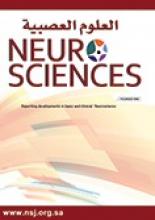Abstract
OBJECTIVE: Multiple sclerosis (MS) is a demyelinating disorder of the central nervous system. Autonomic dysfunction in MS patients may cause significant morbidity. The aim of this controlled cross sectional study was to investigate the prevalence, pattern and severity of autonomic dysfunction in Iraqi MS patients and to correlate them with patient’s age, disease course, duration and severity.
METHODS: Fifty-five patients with clinically definite MS according to Poser’s criteria attending Baghdad MS clinic at Baghdad Teaching Hospital were studied between July 2000 and August 2001. Each patient was assessed according to a detailed protocol paper. Expanded disability status scale was used to assess the severity of the disease. The severity of autonomic symptoms was classified according to autonomic nervous system disability scale (ANSDS). Five standardized autonomic cardiovascular (Ewing) tests were performed for every patient which included: heart rate responses to deep breathing, Valsalva maneuver and standing, and blood pressure responses to standing and sustained hand grip. Forty matched healthy subjects were studied as a control group who were assessed with the same protocol paper, ANSDS and Ewing tests.
RESULTS: Autonomic symptoms were significantly more prevalent in MS patients than in the controls. Cardiovascular, urinary and gastrointestinal symptoms were highly prevalent. The severity of the different autonomic symptoms as assessed by ANSDS, were higher in the patients than the controls. All 5 Ewing tests in the patients showed highly significant abnormal results as compared to those of the control. Definite parasympathetic derangement was found in 45.5% of the patients while combined sympathetic and parasympathetic derangements were found in 34.5% of the patients. There were significant correlations between the finding of definite autonomic dysfunctions and the age of the patients at the time of assessment and the duration of the disease.
CONCLUSION: Autonomic dysfunctions as assessed by a formal interview, ANSDS and by Ewing tests were common in Iraqi MS patients. Careful attention to autonomic disturbances should be considered in the routine evaluation of MS patients which might help in improving their quality of life.
- Copyright: © Neurosciences
Neurosciences is an Open Access journal and articles published are distributed under the terms of the Creative Commons Attribution-NonCommercial License (CC BY-NC). Readers may copy, distribute, and display the work for non-commercial purposes with the proper citation of the original work.






